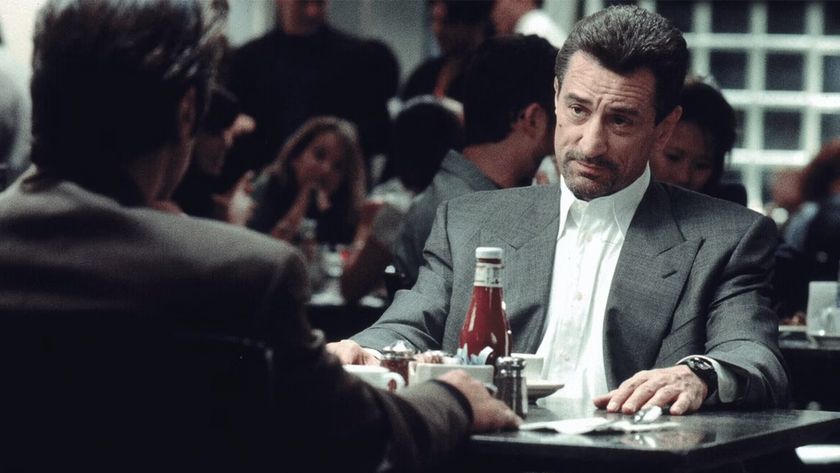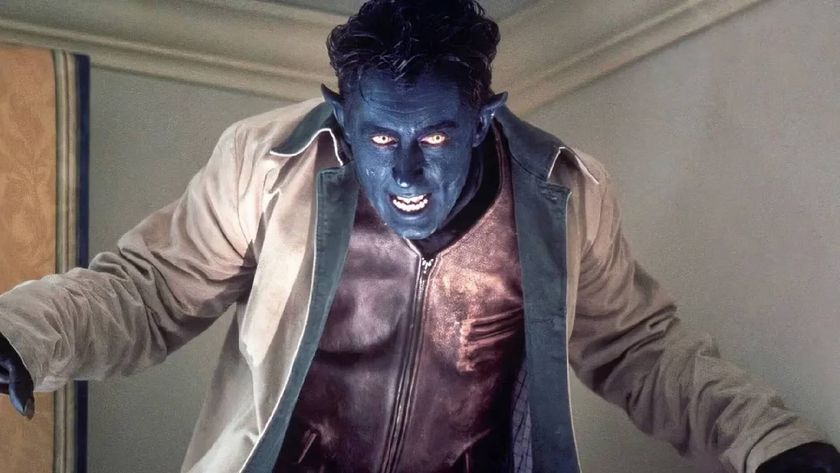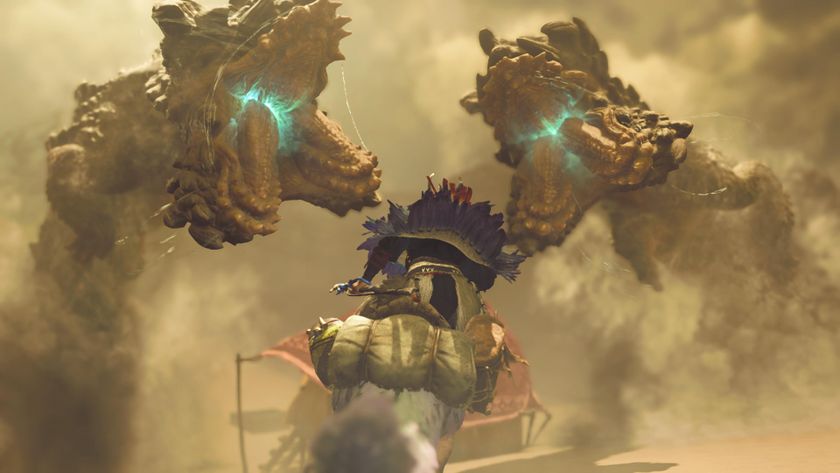The pursuit of excellence: Keanu Reeves and Alex Winter talk us through the making of Bill & Ted: Face the Music
Total Film meets the team behind Bill & Ted: Face the Music, a 29-year labour of love driven by tenacity, artistic integrity, and friendship. And air guitar..
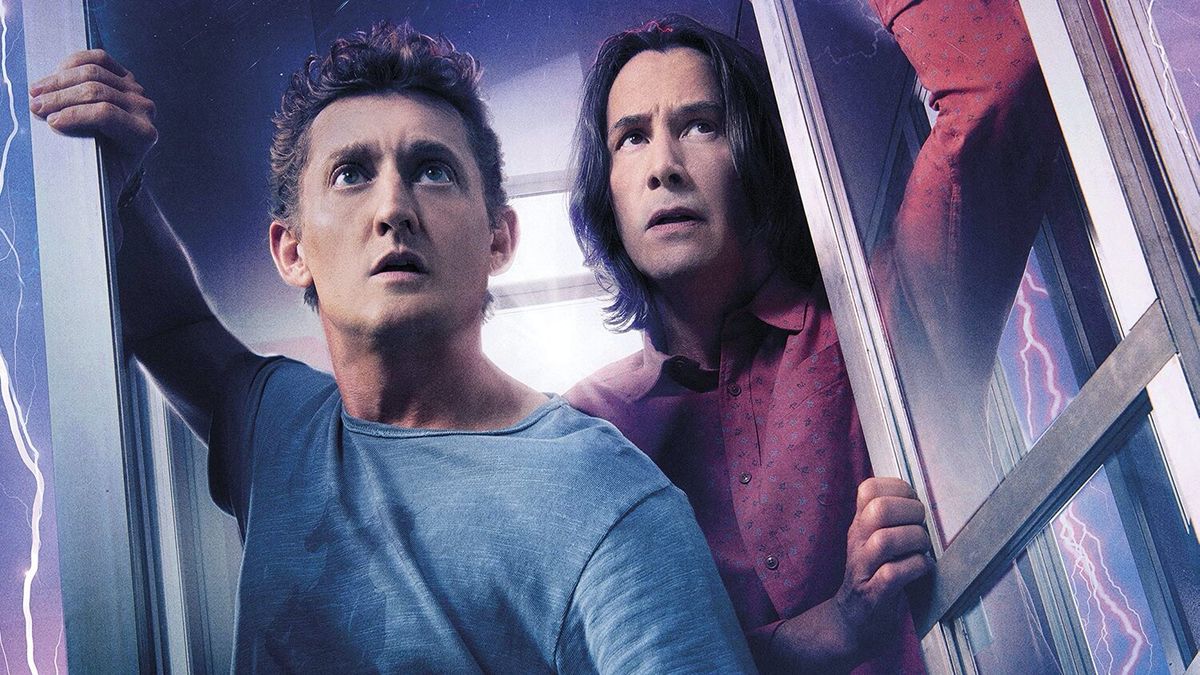
When chatting to Keanu Reeves and Alex Winter, it's sometimes tricky to know which one is talking. They finish each other’s thoughts and sentences, speak with the same laidback cadence and seem to operate on a similar low frequency – all unhurried modesty and unfailing politeness. Though they don’t actually use the vernacular of the characters they’ve now played for 33 years, they’re rocking serious Bill & Ted energy (so much so that Total Film inadvertently refers to them by their character names at one point, much to their amusement). “Keanu and I have known each other and have been good friends a very, very long time at this point,” says Winter, “the relationship we have off-screen is... you know, we’re two grown-ups, right? It’s not like ‘Bill and Ted’ play at all.”
Admittedly they don’t jam together in an atrocious rock band, mime fret- noodling when delighted, time-travel in a phone booth and – as far as we know – hang out at the Circle K. But Reeves and Winter’s strong bond, and that of the team who first put Bill & Ted’s Excellent Adventure together in 1989 and Bill & Ted’s Bogus Journey in 1991, is a driving force in evoking a belated third installment. Because though the films have achieved cult status and Reeves has become a globally bankable megastar, Hollywood wasn’t knocking at their door to make another. No way! Yes way...
Let’s travel back in time to the mid-’80s, when writers Chris Matheson and Ed Solomon came up with the idea of two naive “guys we thought were funny in high school” who they anticipated maybe figuring as skits in a sketch movie. But having worked them into characters of two music-loving, sweet teens, they expanded the concept to a movie and sold the script to uber-producer Dino de Laurentiis. During auditions, then-23-year-old Keanu Reeves and 22-year-old Alex Winter clicked, and their shared vision of Bill S. Preston, Esq. and Ted ‘Theodore’ Logan snagged them the roles that would resonate throughout their careers.
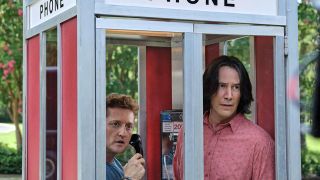
Filmed in Arizona and Italy over the summer of 1987, Excellent Adventure followed the history-flunking high- schoolers as they meet Rufus (George Carlin), a traveller from the future who introduces them to a time-machine phone booth and the concept that they must pass their school tests in order to eventually save the world. Goofy, sweet and zeitgeist-y, the film was a domestic hit that grew and prompted a sequel where the two boys were killed by evil robots from the future, then – with the help of William Sadler’s Death – existentially fought their way back to life and rockstar world fame. Reeves broke out globally with Point Break the same year and the idea of a third film became a long-held wish for fans.
“Working on that material, and getting to play it, I thought it was pretty special,” Reeves says when he considers if he’d anticipated the audience love and the possibility of a trilogy from that first film. “I certainly, at that time, had no expectation that you and I would be speaking here today!” Winter agrees: “Yeah, I mean, the very first movie was made by a bunch of young, scrappy people – and pretty independently, and we didn’t really know what to expect. And frankly, neither did the producers. We knew it was an idiosyncratic film, so we didn’t really know where it was going to go...”
Though the films spawned a stage musical, spin-off TV shows, a comic book and videogames, and helped pave the way for other slacker duos like Wayne’s World and even Jay and Silent Bob, as a franchise Bill & Ted hadn’t made huge international box office. The anecdotal love of multi-generational fans wasn’t enough (“Oftentimes people will say, ‘I showed my kids Bill & Ted’,” Reeves reports, “I say, ‘Did they like it?’ And they say, ‘They loved it!’”).
“The ‘original numbers’, quote-unquote – the stuff that people who finance movies base their decisions on – weren’t there to support the third movie,” explains Ed Solomon. “Because when the first movie came out, it didn’t have an international release. But the numbers themselves didn’t reflect what had happened over the next three decades, which is that somehow the movie itself would grow culturally. People started sharing the movie, and watching it more than any statistics would be able to support. So we had trouble convincing any financing entity that it was worth their money to put it in. As much as we tried, it was like trying to evangelise something that nobody else believed in.”
Sign up for the Total Film Newsletter
Bringing all the latest movie news, features, and reviews to your inbox
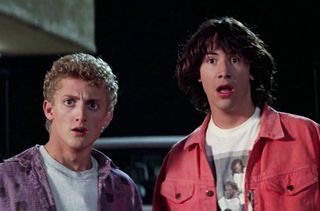
The original team of Solomon, Matheson, Reeves, Winter and Sadler did believe, though, staying in touch over the years and maintaining friendships forged in 1987. “Still to this day, [Reeves and Winter] often have Thanksgiving together and are really close,” says Solomon. That friendship has informed the development of the characters creatively over the years. “They have had a very profound effect on Bill and Ted, because they’ve been playing them for 33 years now,” says Matheson. “So it’s kind of a weird chemistry thing that happened. As we interacted with them, that affected our understanding of who Bill and Ted were, and it shaped them.”
A third adventure for the beloved lunkheads starting taking shape during one of many casual dinners Reeves, Winter, Solomon and Matheson shared. “They mentioned that they had an idea that they thought was kind of funny for a third one and we felt that conceptually it had promise,” recalls Winter. “I think all of our reaction was: you know, none of us need to do this; none of us want to do it if it isn’t really creatively true. We can walk away at any point if it doesn’t feel right... It doesn’t need to happen. And it shouldn’t happen unless it’s done in a way that we think has sincerity and a reason for being.”
“We landed on something they liked, they thought was funny, which was this kind of Christmas Carol version of it, where they’re going into their own futures looking for the song so they can take it from themselves,” continues Matheson. As the foursome continued to meet, Reeves and Winter would give feedback on a logline that became a script. “As it got more developed, instead of orbiting around each other at a distance and then once in a while meeting up,” Reeves recalls, “the orbit got super-close – and we kind of became a tight-knit group, creatively collaborating on the material.”
That tight-knit group eventually widened to include director and their old friend Dean Parisot, as well as the Grim Reaper himself, William Sadler. “There was talk of it for years, and I was always interested in doing it, because this is one of the most fun characters that I’ve ever played in my long and chequered career,” Sadler laughs. “Ed called me one day and said, ‘Are you interested? I’ve written Death into the new movie.’ I wasn’t sure it was ever going to come together. I was beginning to lose hope...”
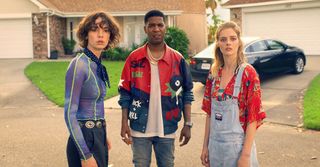
Parisot, on-board for seven years, understands Sadler’s pessimism. “We kept trying to get it set up. It was not a moneymaking proposition for anybody, including us. But we all liked each other, and we knew each other from other environments, and we’re all committed to making it. So it was a labour of love. It was the opposite of the way many movies are made.”
The green light finally came in 2018 when the project was bankrolled after years of careful nursing by the team. “Thanks to social media and people’s popular voices coming through social media – the powers that be started to hear those voices, and that’s what turned it around,” says Solomon. Sadler agrees: “All of a sudden, it was like, ‘Well, of course we’re going to make it! It’s the most anticipated movie...’ All of a sudden, everybody wants to be in it, and everybody wants to be a part of it... ‘Oh my God, what took you so long?’”
That’s not to say that a cult movie sequel, decades in the making, with huge audience anticipation had money thrown at it either. Bill & Ted Face The Music finds the titular twosome in their fifties, still married to Princesses Elizabeth and Joanna, fathers to 24-year-old daughters Billie (Brigette Lundy-Paine) and Thea (Samara Weaving) [See box-outs page 34] – and having never achieved their destiny of writing the song that saves the world. Floundering in middle-age, they are visited from the future by Kristen Schaal’s Kelly, playing the daughter of Rufus (George Carlin passed away in 2008) who tells them that this song needs to be written now. Bill and Ted decide to use their trusty phone booth to travel to their own futures and steal the song from themselves. Multiple future timelines ensue and their former bandmate, Death, is roped in to help...
“I would say, for production, we probably had the amount of money we’d get to make a television pilot,” chuckles Parisot. “And we had to make a movie that takes place in Hell, and has the destruction of space and time, and the future prosthetics. It was logistically very difficult to make. What made it easier to make was that almost everybody I had worked with over the years – well-known artists with a collection of awards under their belts – took incredible pay cuts, and did anything to accomplish this project. I think it’s because there’s such a love for these characters and what they represent. We have struggled the entire time to eke out something that we loved. But it’s a testament to everyone’s commitment, because both Keanu and Alex, and Chris and Ed, never gave up. But that sort of made it all great fun."
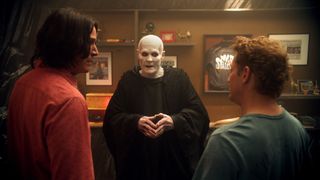
That copacetic attitude is what Reeves feels will give the threequel the same energy as the original films and what steered it from an artistic-integrity point of view. This, he stresses, is no cash-in. "We're still a pretty scrappy independent movie," he laughs, "It's part of its charm! This movie is very much in the spirit of the other two films across the board. So there are Easter egg cameos, and there are other important musical figures that are prominent. I don't want to give too much of it away but the spirit of it, all the way down to the soundtrack... it's a Bill & Ted movie, straight up."
"People will recognise them as who they are from the get-go," Winter chimes in. "They haven't turned into different people. But a lot of the comic conceit comes from that idea. If you’ve got two normally unstoppable, persevering characters like this who are faced with a pretty great challenge, and they’re older, and they’re dealing with the realities of life on top of the challenges they’re facing, then what does that do?”
“The trick was,” says Parisot, “how do you contemporise, but not lose those characters?” Now with more savvy daughters helping them on their quest, plus newly cast wives (Jayma Mays and Erinn Hayes replace original princesses Kimberley Kates and Diane Franklin) and music-star cameos (Kid Cudi is confirmed), the team hope that Face The Music can walk that tricky line of paying fan service while still feeling fresh. “We just felt that if we made a really sincere and funny Bill & Ted movie, then it would be inclusive by nature,” says Winter. “That was the agenda... so we knew we had to play air guitar...” “Yeah,” guffaws Reeves, “we had to play air guitar!”
Filming in New Orleans in the summer of 2019 (in 100-degree heat and humidity, and through a hurricane and a tornado), Reeves and Winter finally stepped on set as Bill and Ted after decades of anticipation. “Coming up to filming – you know, there were rehearsals, meetings with the writers and the director and the producers and a lot of roundtables and going through material,” says Reeves, then turning to Winter, “Al, you and I, we’re meeting and trying to look at the shape and the journey of the characters... but when we finally started to play them, I felt like we were ready to start to be them here and now. And what was really nice to have happen was that they were still really fun to play. And that was really cool.” Winter nods: “I would echo that. There was a sweetness to being on-set with a bunch of people that we’ve known our whole lives. Our first scene was a heightened moment, with a horse... I remember we were looking at each other, and going, ‘Yeah, this is really fun!’”
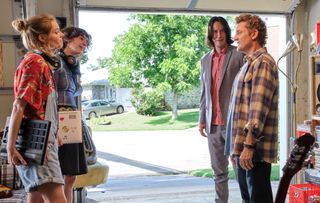
Not so much fun for Sadler, though, traipsing through NOLA in three hours of make-up and Death robes. “When I walked onto the set, it was extraordinary. I mean, there were hugs, and laughing, and it was just so nice for the band to be back together. But the very first take of the very first moment in the film, I’m doing hopscotch. And I tripped – the first take. I fell and I sprained my right wrist. My hand swelled up, they had to stop... I thought, ‘Oh, no, this has gotten off to a terrible start. I’m too old to do this.’ But then we broke for lunch and when we came back we did the scene between the boys and myself. And the set just lit up with fireworks! The script lifted off the ground. We finished the take, and everybody in the room was just kind of spellbound for a moment. And then it was just like we had never said goodbye, you know? The spirits were all there. It was just as silly and goofy as the first one, and all of that delicious sort of innocence came back out. Sitting next to each other in director’s chairs on the set, Keanu and Alex felt like an old married couple, you know? They fixed each other’s hair. They joked. They giggled and shared stories...”
As someone who had only recently seen the first movies, actor Brigette Lundy-Paine, playing Ted’s offspring, Billie, was equally transfixed. “[Reeves and Winter] were so young when they did the first movie, and I think that that’s a bond that never goes away. A character is shared between the writer, the director, every single person on set, and the actor. But it really lives in the actor’s body. So we got to see that wake-up. It was an extreme privilege, to watch these dudes get back to their childhood selves. And that’s kind of the point of the movie. It’s like, we all have these dudes deep inside us, every single one of us, and it can be awoken.”
Surely though, modern technology has made the experience of reawakening their inner dudes more sophisticated? “Is the phone booth more comfortable?” Reeves ponders, comparing filming decades apart – when Excellent Adventure had infamously low-tech special effects, whipping him and Winters around in a booth on a rudimentary gimbal. “Well, no, not really.”

“I guess it’s more comfortable in that – not to give the plot away, but we jam less people into this one,” Winters chuckles. “And they didn’t stick us sideways into the end of a carnival hydraulic unit, like when they did and almost damn near killed everybody!”
Solomon and Matheson also make on-screen appearances as ‘ugly butlers’ (they cameoed as the ice cream servers in Excellent Adventure and as séance members in Bogus Journey) and feel that though the scenario has changed, Reeves and Winter’s innate ability to channel what makes Bill and Ted so appealing as characters is still there. Solomon recalls Excellent Adventure director Stephen Herek giving his leads the character note to give ‘lab energy’. “Like a Labrador Retriever. You know, sweet, loyal and loving. I think that’s what Bill and Ted represent. It’s that kind of unabashed loyalty to each other. There’s no moment where they’re separated. They literally do everything together. What you want from a relationship is someone who always has your back, and is never going to leave you. And there’s something really lovely about that dynamic.”
That’s not easy to play, Parisot notes, yet Reeves and Winter nail it. “It’s a hard tone to hold onto, because it’s an absurdist tone,” Parisot notes, “it’s not really a big comedy tone. They’re absurd characters in absurd situations.” But perhaps, Reeves and Winter can essay that so easily because of the genuine relationship they have off-camera. “My perception is that Alex and Keanu do have that kind of friendship,” says Matheson. “That’s what it looks like. And that’s certainly what they play.” In typically modest fashion, the star duo take little credit for the mass appeal of their guileless heroes.“There’s a genuine sincerity to them that isn’t36 cynical or meta,” says Winter, “And I think that that has seemed to resonate with people.”
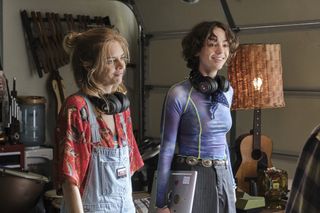
Will Bill and Ted still resonate today though? For every Blade Runner 2049, there have been missteps in bringing franchises back from the dead. And the world the film will now be releasing in is a very different one from the one we were all living in before Covid-19, political upheaval and social injustices. “Obviously we didn’t expect a pandemic,” admits Parisot, “but it turned out that this felt like an optimistic, hopeful story in the midst of all this craziness.” Lundy-Paine certainly thinks that the times demand a movie that trades in kindness. “Bill and Ted’s story is about sharing, and community, and asking for help... and it’s OK to ask for help.” Sadler agrees: “Messages of hope are just important. Boy, do we need each other. We need to be excellent to each other.”
Indeed, one of Bill and Ted’s most important tenets is, “Be excellent to each other,” a message we could all live by right now. “It’s not an issues movie, and it’s not a political movie,” Reeves says. “But the tone of the movie does stand by its message of, ‘Be excellent to each other,’ and, ‘Party on,’ and, you know, be part of life, enjoy life, and be good to your neighbour. It’s not the worst thing to be saying at the moment.”
And although it’s slated for a cinematic release, the team are sanguine about the way their audiences eventually see their long-gestated project – whether that’s on a big screen or not. “I just hope that as many people see it as possible,” Parisot sighs. “We’re in such a polarised, dangerous and tension-filled moment in history. I would like people to rally, rather than, you know, go the other direction.”
Having had the stamp of approval from Kevin Smith (he reportedly wept watching a preview and called it “fucking wonderful”), it feels like Face The Music could make considerably more money than its predecessors and warrant exploration of a fourth installment? “I think [Face The Music] is the end,” laughs Matheson. “Three is kind of the magic number, and I don’t think the guys would want to do it...” Solomon isn’t as sure, though. “We never thought we’d do one after Bogus Journey. And 15 years later, we started talking about another film, so ask us again in another 15 years. Maybe we’ll revisit it and it’ll be called Bill & Ted Die!”
For Reeves and Winter, they’ve achieved what they set out to do all those years ago. “Our ambition for it was, we wanted it to be funny,” says Reeves. “Hopefully it is for other people. But we were just trying to do that – to make a fun film. We’re not really going to know if we’ve succeeded or not until the audience respond to it.” He pauses. “It’s kind of a quantum question.” What a perfectly Ted answer...
- Not a subscriber to Total Film? Then head on over here to get the latest issues sent directly to your home/device
Bill & Ted is available in the US on VOD from August 28. The threequel reaches UK cinemas September 23. For more on Bill& Ted, read our "making of" the first movie in the series.
Jane Crowther is a contributing editor to Total Film magazine, having formerly been the longtime Editor, as well as serving as the Editor-in-Chief of the Film Group here at Future Plc, which covers Total Film, SFX, and numerous TV and women's interest brands. Jane is also the vice-chair of The Critics' Circle and a BAFTA member. You'll find Jane on 12DOVE exploring the biggest movies in the world and living up to her reputation as one of the most authoritative voices on film in the industry.
